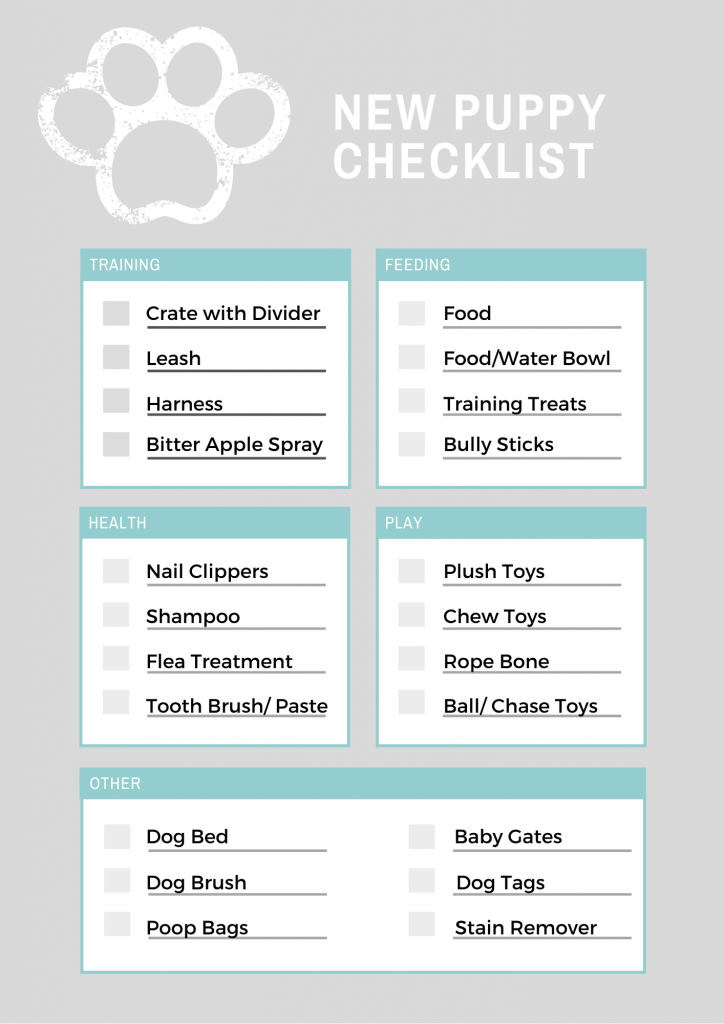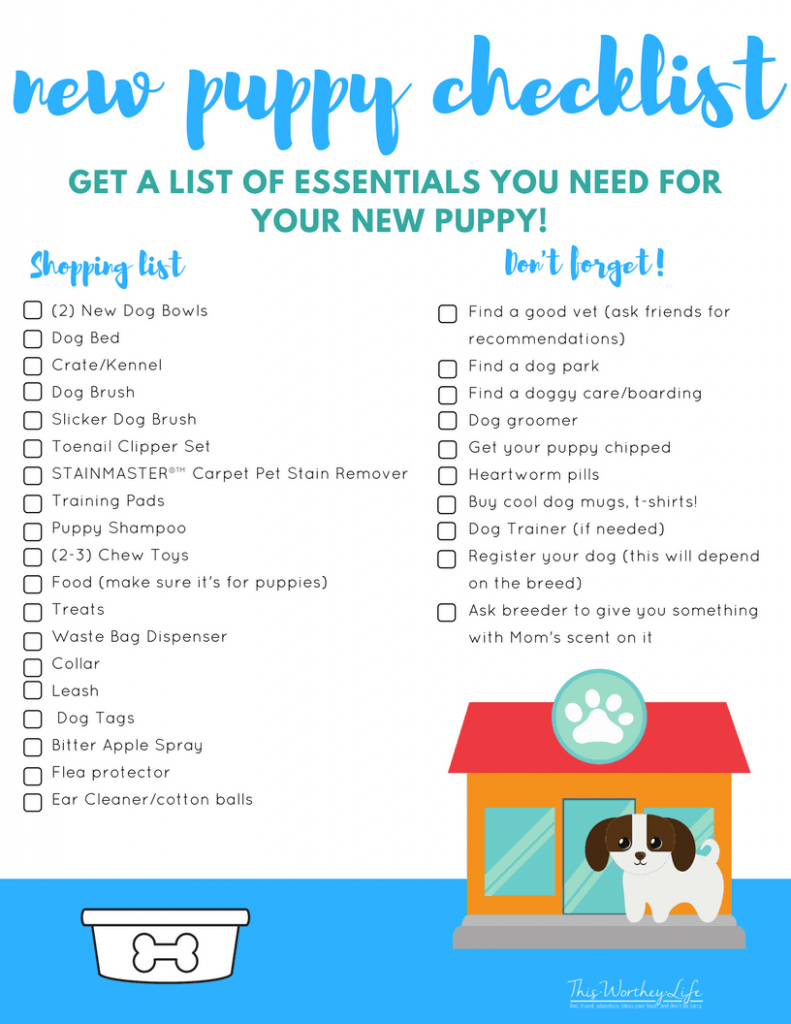As a proud dog owner, I know how exciting it can be to bring a new furry friend into your home. But it’s important to remember that puppies require a lot of care and attention. That’s why I’ve put together this list of must-haves for any new puppy parent, to ensure that both you and your pup have a smooth transition into your new life together.
- A Good-Quality Dog Food
The first item on your new puppy checklist should be a high-quality dog food. Look for one that contains all of the essential nutrients your pup needs to grow and develop properly. Avoid foods that contain fillers like corn, wheat, or soy, and opt for a brand that lists meat as the first ingredient.
 It’s also important to choose a food that’s appropriate for your puppy’s age, breed, and size. You may want to consult with your veterinarian to get a recommendation based on your puppy’s individual needs. And remember to always provide plenty of fresh water alongside your pup’s meals.
It’s also important to choose a food that’s appropriate for your puppy’s age, breed, and size. You may want to consult with your veterinarian to get a recommendation based on your puppy’s individual needs. And remember to always provide plenty of fresh water alongside your pup’s meals.
- Toys and Chews
Puppies love to play, so it’s important to have a selection of toys and chews to keep them occupied. Look for toys made of durable materials, like rubber or nylon, that are designed to withstand plenty of chewing and roughhousing.
 You can also consider providing your pup with interactive toys, like puzzle feeders, that encourage mental stimulation and provide a fun challenge. And don’t forget to rotate your pup’s toys regularly to keep them interested and engaged.
You can also consider providing your pup with interactive toys, like puzzle feeders, that encourage mental stimulation and provide a fun challenge. And don’t forget to rotate your pup’s toys regularly to keep them interested and engaged.
- A Comfortable Bed
Puppies need plenty of sleep and rest to grow and develop properly, so it’s important to provide them with a comfortable bed that meets their needs. Look for a bed that’s the appropriate size for your pup and made of high-quality materials that are easy to clean.
 Consider a bed that has raised edges or sides, which can provide a sense of security for your puppy. And if your pup isn’t yet fully potty-trained, look for a bed that has a removable, washable cover that can be easily cleaned in case of accidents.
Consider a bed that has raised edges or sides, which can provide a sense of security for your puppy. And if your pup isn’t yet fully potty-trained, look for a bed that has a removable, washable cover that can be easily cleaned in case of accidents.
- Grooming and Cleaning Supplies
Puppies require regular grooming to keep them clean and healthy. Make sure to have basic grooming supplies on hand, like a brush, nail clippers, and shampoo.
 You’ll also want to have cleaning supplies to tackle any accidents your pup may have. Look for enzymatic cleaners that are designed specifically for cleaning up pet messes, and keep a supply of paper towels and a spray bottle of cleaner in an easily accessible spot.
You’ll also want to have cleaning supplies to tackle any accidents your pup may have. Look for enzymatic cleaners that are designed specifically for cleaning up pet messes, and keep a supply of paper towels and a spray bottle of cleaner in an easily accessible spot.
- A Secure Crate or Carrier
A crate or carrier is an essential item for any new puppy parent. A crate can provide your pup with a sense of security and a safe space to retreat to when they need some alone time, and can also be a useful tool for potty-training and preventing destructive behavior.
 Look for a crate or carrier that’s the appropriate size for your pup and made of durable, easy-to-clean materials. And remember to always provide plenty of water and soft bedding inside the crate.
Look for a crate or carrier that’s the appropriate size for your pup and made of durable, easy-to-clean materials. And remember to always provide plenty of water and soft bedding inside the crate.
- A Complete Set of Vaccinations
Your new puppy will need a complete set of vaccinations to protect them from a range of diseases and illnesses. Make sure to schedule an appointment with your veterinarian to get your pup started on their vaccination schedule as soon as possible.
 It’s also important to remember to keep up with your pup’s regularly-scheduled booster shots and to get them checked up by your vet at least once a year.
It’s also important to remember to keep up with your pup’s regularly-scheduled booster shots and to get them checked up by your vet at least once a year.
- Leash and Collar
A leash and collar are required items for any dog owner. Even if you don’t plan on taking your pup on walks right away, it’s important to start getting them used to wearing a collar and leash early on.
 Look for a collar that’s the appropriate size for your pup and made of durable materials that can withstand plenty of wear and tear. A harness can also be a good option for puppies, as it provides more support for their growing bodies.
Look for a collar that’s the appropriate size for your pup and made of durable materials that can withstand plenty of wear and tear. A harness can also be a good option for puppies, as it provides more support for their growing bodies.
- Training Treats
Puppies require plenty of positive reinforcement and reward-based training to learn good behavior. Training treats can be a great tool for encouraging your pup to learn basic obedience commands and more advanced tricks.
 Look for treats that are made of high-quality ingredients and don’t contain fillers or artificial additives. You can also consider making your own training treats at home, using simple ingredients like chicken, cheese, or peanut butter.
Look for treats that are made of high-quality ingredients and don’t contain fillers or artificial additives. You can also consider making your own training treats at home, using simple ingredients like chicken, cheese, or peanut butter.
- A List of Emergency Contacts
Last but not least, it’s important to have a list of emergency contacts on hand in case of any unexpected situations. Make sure to have your veterinarian’s contact information handy, as well as the contact information for a local emergency veterinary clinic.
 You’ll also want to have the contact information for a trusted pet sitter or boarding facility, in case you need to leave your pup alone for an extended period of time. And don’t forget to have a list of family members or friends who can help out in case of an emergency.
You’ll also want to have the contact information for a trusted pet sitter or boarding facility, in case you need to leave your pup alone for an extended period of time. And don’t forget to have a list of family members or friends who can help out in case of an emergency.
With these essential items and plenty of love and attention, your new puppy is sure to thrive and grow into a happy, healthy dog. Good luck with your new furry friend!